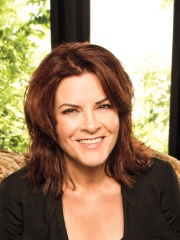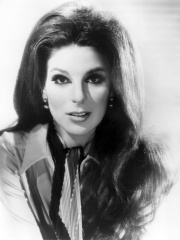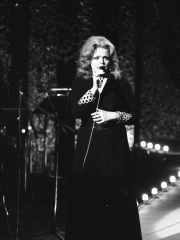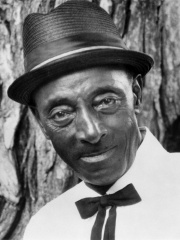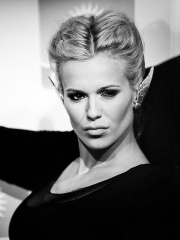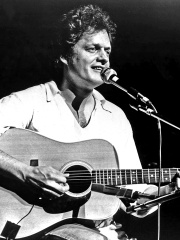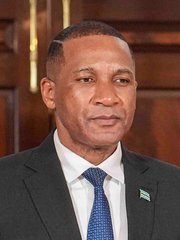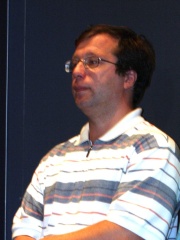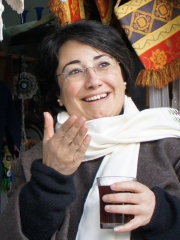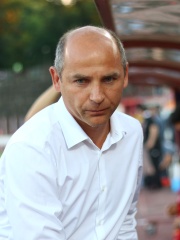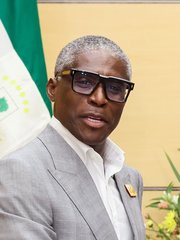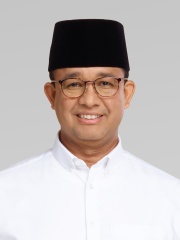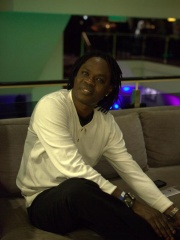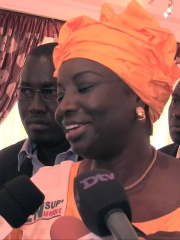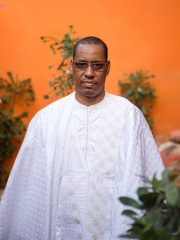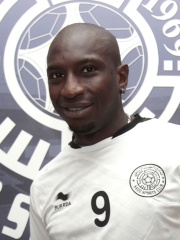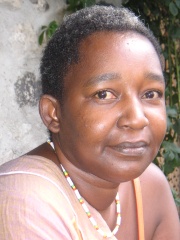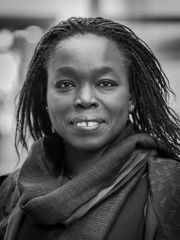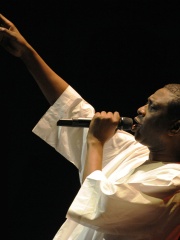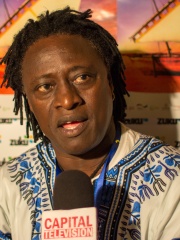Singer
MC Solaar
1969 - Today
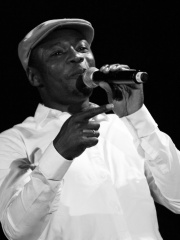
 MC Solaar
MC Solaar
Claude Honoré M'Barali (French pronunciation: [klod ɔnɔʁe ɛmbaʁali]; born 5 March 1969), professionally known as MC Solaar (pronounced [ɛm si sɔˈlaʁ]), is a French rapper of Senegalese and Chadian origin. He is one of France's most famous and influential hip hop artists. Some consider him the best French rapper of all time. MC Solaar is known for his complex lyrics and distinctive flows, which rely on word play, lyricism, and inquiry. Read more on Wikipedia
His biography is available in 20 different languages on Wikipedia. MC Solaar is the 2,172nd most popular singer (down from 2,024th in 2024), the 46th most popular biography from Senegal (down from 42nd in 2019) and the 3rd most popular Senegalese Singer.
Memorability Metrics
Page views of MC Solaar by language
Among Singers
Among singers, MC Solaar ranks 2,172 out of 4,381. Before him are Tijana Dapčević, Rosanne Cash, Taisia Povaliy, Bobbie Gentry, Dulce María, and Ellen Nikolaysen. After him are Mississippi Fred McDowell, Doda, Jill Johnson, Enrique Bunbury, C. J. Ramone, and Harry Chapin.
Most Popular Singers in Wikipedia
Go to all RankingsTijana Dapčević
1976 - Present
HPI: 50.74
Rank: 2,166
Rosanne Cash
1955 - Present
HPI: 50.73
Rank: 2,167
Taisia Povaliy
1964 - Present
HPI: 50.72
Rank: 2,168
Bobbie Gentry
1942 - Present
HPI: 50.71
Rank: 2,169
Dulce María
1985 - Present
HPI: 50.71
Rank: 2,170
Ellen Nikolaysen
1951 - Present
HPI: 50.69
Rank: 2,171
MC Solaar
1969 - Present
HPI: 50.69
Rank: 2,172
Mississippi Fred McDowell
1906 - 1972
HPI: 50.69
Rank: 2,173
Doda
1984 - Present
HPI: 50.69
Rank: 2,174
Jill Johnson
1973 - Present
HPI: 50.68
Rank: 2,175
Enrique Bunbury
1967 - Present
HPI: 50.68
Rank: 2,176
C. J. Ramone
1965 - Present
HPI: 50.67
Rank: 2,177
Harry Chapin
1942 - 1981
HPI: 50.66
Rank: 2,178
Contemporaries
Among people born in 1969, MC Solaar ranks 474. Before him are Duma Boko, Stéphane Lannoy, Akemi Noda, Alexey Dreev, Haneen Zoabi, and Viktor Skrypnyk. After him are Teodoro Nguema Obiang Mangue, Sergei Fedorov, Kimberly Guilfoyle, Anies Baswedan, Brett Favre, and Soraya.
Others Born in 1969
Go to all RankingsDuma Boko
POLITICIAN
1969 - Present
HPI: 50.78
Rank: 468
Stéphane Lannoy
REFEREE
1969 - Present
HPI: 50.77
Rank: 469
Akemi Noda
SOCCER PLAYER
1969 - Present
HPI: 50.75
Rank: 470
Alexey Dreev
WRITER
1969 - Present
HPI: 50.74
Rank: 471
Haneen Zoabi
POLITICIAN
1969 - Present
HPI: 50.73
Rank: 472
Viktor Skrypnyk
SOCCER PLAYER
1969 - Present
HPI: 50.71
Rank: 473
MC Solaar
SINGER
1969 - Present
HPI: 50.69
Rank: 474
Teodoro Nguema Obiang Mangue
POLITICIAN
1969 - Present
HPI: 50.69
Rank: 475
Sergei Fedorov
HOCKEY PLAYER
1969 - Present
HPI: 50.68
Rank: 476
Kimberly Guilfoyle
LAWYER
1969 - Present
HPI: 50.68
Rank: 477
Anies Baswedan
POLITICIAN
1969 - Present
HPI: 50.67
Rank: 478
Brett Favre
AMERICAN FOOTBALL PLAYER
1969 - Present
HPI: 50.66
Rank: 479
Soraya
SINGER
1969 - 2006
HPI: 50.63
Rank: 480
In Senegal
Among people born in Senegal, MC Solaar ranks 46 out of 138. Before him are Baaba Maal (1953), Marie Senghor Basse (1930), Aminata Touré (1962), Cherif Mohamed Aly Aidara (1959), Khalilou Fadiga (1974), and Ousmane Sonko (1974). After him are Mamadou Niang (1979), Jules Bocandé (1958), Henri Camara (1977), Khady Sylla (1963), Cheikh Hadjibou Soumaré (1951), and Fatou Diome (1968).
Others born in Senegal
Go to all RankingsBaaba Maal
MUSICIAN
1953 - Present
HPI: 52.59
Rank: 40
Marie Senghor Basse
PHYSICIAN
1930 - 2019
HPI: 52.48
Rank: 41
Aminata Touré
POLITICIAN
1962 - Present
HPI: 51.96
Rank: 42
Cherif Mohamed Aly Aidara
RELIGIOUS FIGURE
1959 - Present
HPI: 51.35
Rank: 43
Khalilou Fadiga
SOCCER PLAYER
1974 - Present
HPI: 51.23
Rank: 44
Ousmane Sonko
POLITICIAN
1974 - Present
HPI: 51.12
Rank: 45
MC Solaar
SINGER
1969 - Present
HPI: 50.69
Rank: 46
Mamadou Niang
SOCCER PLAYER
1979 - Present
HPI: 49.82
Rank: 47
Jules Bocandé
SOCCER PLAYER
1958 - 2012
HPI: 49.76
Rank: 48
Henri Camara
SOCCER PLAYER
1977 - Present
HPI: 49.58
Rank: 49
Khady Sylla
WRITER
1963 - 2013
HPI: 49.41
Rank: 50
Cheikh Hadjibou Soumaré
POLITICIAN
1951 - Present
HPI: 49.03
Rank: 51
Fatou Diome
WRITER
1968 - Present
HPI: 48.36
Rank: 52
Among Singers In Senegal
Among singers born in Senegal, MC Solaar ranks 3. Before him are Youssou N'Dour (1959), and Habib Koité (1958).
Youssou N'Dour
1959 - Present
HPI: 65.73
Rank: 1
Habib Koité
1958 - Present
HPI: 54.47
Rank: 2
MC Solaar
1969 - Present
HPI: 50.69
Rank: 3

